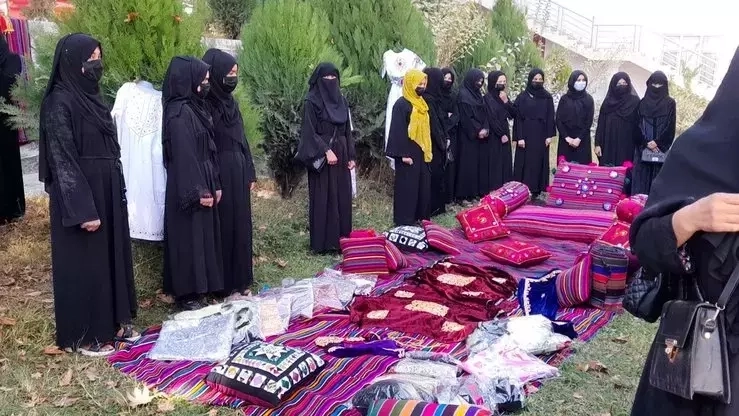By Raha Azad
Nilab* hadn’t planned to be an entrepreneur, but when the Taliban banned her from working in her government job, she felt she had no other choice.
“After the Taliban took control of Afghanistan, I became unemployed and realized that I had no other option but to engage in trade. That’s why I turned to business, so I could both work and support my family’s expenses,” she says.
The 27-year-old was married to a soldier who died in a battle with Taliban forces before the fall of Kunar province.
Now Nilab supports her family of five alone by selling Sheghnani garments (Badakhshani traditional dress) and jewelry at a local handicraft shop in Badakhshan province’s Faizabad Market.
When asked about the difference between her situation now and how it was three years ago, she pauses for a moment. After clearing her throat, she replies: “Three years ago, everything was as I desired – there was food, work, and freedom. But now, there is neither food, nor work, nor freedom.”
Dealing with constant harassment
Nilab’s customers are mostly women and girls. She feels this has attracted more attention from the Taliban’s morality police.
“This spring, the vice and virtue police entered our shop several times without permission and suddenly began harassing and troubling us,” she says.
“They tell us that we must wear a veil in our workplace because our unveiled presence ‘influences’ the customers. But in our workplace, only women are present. The only men who come here are vice and virtue police.”
Nilab says the situation seems to be getting worse every day with the market slowing and harassment rising. With other women working less and less, there are fewer customers for her business as they lose their purchasing power.
Nilab says these days she barely earns seven to eight thousand afghanis (US$100) per month.
Online business also targeted
In the north-eastern province of Badakhshan, Somaiya felt the Taliban authorities were also targeting her women-led business despite operating online.
The 24-year-old was hosting a work meeting at her home when Taliban forces arrived to detain her on September 11 last year.
Herself and some colleagues – male and female – were sharing ideas about improving the business when the Taliban arrived. They were taken to the police station for questioning.
Somiaya was released without further detention, but she was ordered to not continue her online business. She heeded the warning and shut it down.
As the breadwinner for her parents’ family of eight, she couldn’t afford not to have an income. Her father is a retired officer. Somiaya says he hasn’t received his pension since the Taliban seized power. So she opened a women’s clothing store in Badakhshan’s capital city Faizabad. But before long, she closed this too.
“Several morality police came to my shop saying, ‘You are promoting improper hijab here and you do not observe the hijab. We will close your shop’,” she said.
After the last visit in March when the Taliban vice and virtue officials visited again saying they would shut her down, she’d had enough.
“The vice and virtue officials were coming every day, causing trouble, and insulting and belittling me, saying that I promote indecency and improper hijab,” she said.
Somaiya has decided to return to running an online business to avoid the relentless visits from Taliban officials.
With her mother as a co-founder, they started an online food business preparing food and delivering it to customers’ homes. She does not want to reveal details about it for fear of the Taliban shutting it down or threatening her again.
Theory versus practice
The Taliban have introduced sweeping restrictions on the lives of women and girls in Afghanistan, including banning education for girls above grade six, banning recreational and professional sport, and banning travel without a male chaperone.
Shopkeeping and small business is one of the few sectors where the Taliban have not explicitly curtailed women’s involvement for the most part. However, in practice, its forces and morality police have created enormous challenges.
In a report published last month, the United Nations said that female entrepreneurs in Afghanistan say the restrictions on their lives affect their business.
It said over 70 percent of female entrepreneurs and traders interviewed said they cannot travel to markets without a male chaperone.
The report also found women’s employment rate in the country has halved, further making businesses run by women difficult for them to earn money from their target customers.
Local Taliban authorities refute the claim they don’t support women’s business, pointing to the existence of women in business.
“About 17 to 18 women in Badakhshan have official commercial establishments and are engaged in various sectors, and about 100 others are informally working and active. Some of these women are being supported by international aid organizations,” an official at the Taliban’s Department of Industry and Commerce in Badakhshan told Rukhshana Media.
They requested not to be named in the story.
Note*: Names are changed due to security reasons.








